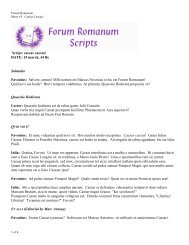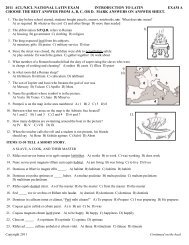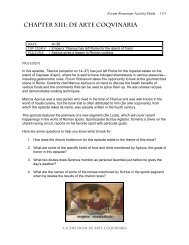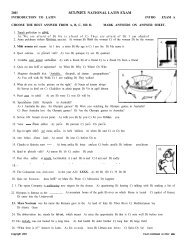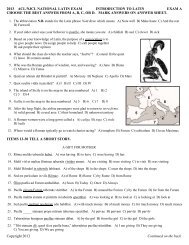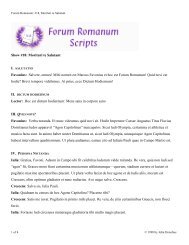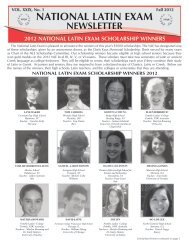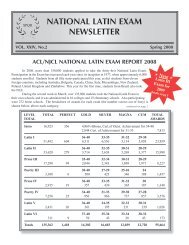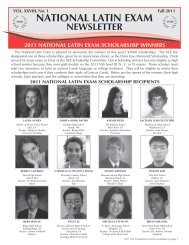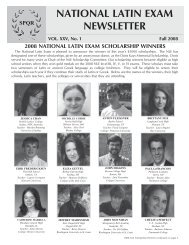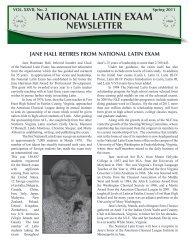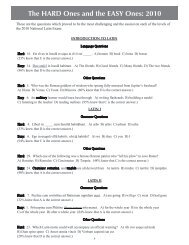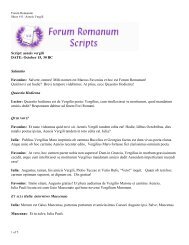2009 acl/njcl national latin exam introduction to latin intro exam a ...
2009 acl/njcl national latin exam introduction to latin intro exam a ...
2009 acl/njcl national latin exam introduction to latin intro exam a ...
You also want an ePaper? Increase the reach of your titles
YUMPU automatically turns print PDFs into web optimized ePapers that Google loves.
READ THE PASSAGES AND ANSWER THE QUESTIONS.<br />
Copyright <strong>2009</strong><br />
Copyright <strong>2009</strong><br />
A FLIGHT FOR FREEDOM<br />
A runaway slave makes a fateful decision.<br />
Servus, Antius nōmine, ex agrīs effugiēbat quod cinis et lapidēs dē 1 cinis = ash<br />
caelō cadēbant. Servus, quī lībertātem et dīvitiās saepe cupīverat, spērābat 2 dīvitiās = riches<br />
dominum in tantā cōnfūsiōne nōn sē inventūrum esse. Dum per agrōs 3 sē refers <strong>to</strong> Servus (line 2)<br />
currit, Antius cōnspexit plaustrum in quō complūrēs hominēs perterritī 4 plaustrum = wagon<br />
vehēbantur. “Heus,” clāmāvit agitā<strong>to</strong>r, “Ascende! Servā tē! Vesuvius nōn iam 5 agitā<strong>to</strong>r = driver<br />
dormit.” Sine morā Antius in plaustrum ascendit. 6<br />
27. In line 1, quod is best translated A) that B) what C) which D) because<br />
28. According <strong>to</strong> lines 1-2 (servus...cadēbant), why does Antius run from the fields?<br />
A) he sees the farmhouse in flames B) ash and s<strong>to</strong>nes are falling from the sky<br />
C) the slaves are beginning a revolt D) an army is attacking<br />
29. According <strong>to</strong> lines 2-3, Antius hopes that A) he can find his friend B) everyone will find wealth<br />
C) his master will pay him D) he will escape<br />
30. What is the best translation of nōn sē inventūrum esse (line 3)? A) he has not been found<br />
B) would not find him C) was not finding him D) is not finding him<br />
31. According <strong>to</strong> lines 5-6, the driver shouted at Antius <strong>to</strong> A) show him the way B) get out of the way<br />
C) save himself D) return home<br />
32. How does Antius climb in<strong>to</strong> the wagon (line 6)? A) reluctantly B) painfully C) immediately D) thankfully<br />
Brevī tempore agitā<strong>to</strong>r senem vix ferentem arcam gravem cōnspexit. “Licet 7 arcam = chest<br />
tibi,” clāmāvit agitā<strong>to</strong>r, “in plaustrum ascendere sed arca tibi relinquenda est!” 8<br />
Senex arcam statim dēiēcit atque in plaustrum ascendit. Antius arcam ērumpere 9<br />
et permultōs nummōs aureōs ac argenteōs prōfundere in viam vīdit. Cum 10 nummōs = coins; prōfundere =<br />
cinis et lapidēs cadere frequentius inciperent, Antius tamen dē plaustrō statim 11 poured out<br />
dēsiluit et nummōs repetere incēpit. Agitā<strong>to</strong>r Antiō imperāvit ut in plaustrum 12<br />
revenīret sed servus, immemor perīculī, eī nōn pāruit. Antius igitur relictus est. 13 immemor = forgetful of; pāruit<br />
Paucīs post diēbus, ēruptiōne perfectā, Antius, dormientī similis, adhūc 14 = obeyed<br />
nummōs in manibus tenēns, ā suō dominō inventus est. 15<br />
33. According <strong>to</strong> line 7, what is the old man doing? A) falling over a chest B) pointing out a chest<br />
C) running with a chest D) having difficulty carrying a chest<br />
34. What is the best translation of arca tibi relinquenda est (line 8)?<br />
A) you have <strong>to</strong> leave the chest behind B) you will not want <strong>to</strong> leave the chest behind<br />
C) the chest can’t be left behind D) the chest has been left behind<br />
35. In line 9, we learn that the old man A) gave the chest <strong>to</strong> his friend B) fell over the chest<br />
C) threw down the chest D) begged <strong>to</strong> bring the chest along<br />
36. According <strong>to</strong> lines 11-12, why did Antius jump down from the wagon? A) <strong>to</strong> pick up the coins<br />
B) <strong>to</strong> run for cover C) <strong>to</strong> look for his master D) <strong>to</strong> help others climb on board<br />
37. According <strong>to</strong> lines 12-13 (Agitā<strong>to</strong>r...pāruit), the driver ordered Antius <strong>to</strong> A) fix the wagon’s wheel<br />
B) get back in the wagon C) help others in<strong>to</strong> the wagon D) throw the old man out of the wagon<br />
38. In line 13, eī refers <strong>to</strong> A) the driver B) Antius C) the old man D) the master<br />
39. According <strong>to</strong> lines 14-15, in what condition was Antius found by his master? A) sitting and crying<br />
B) as if sleeping C) struggling with his chest of coins D) trembling with fear<br />
40. The moral of the s<strong>to</strong>ry is A) Always give help <strong>to</strong> those in need. B) Do not accept help from a stranger.<br />
C) Life is more important than money. D) Always remember <strong>to</strong> thank the gods.



